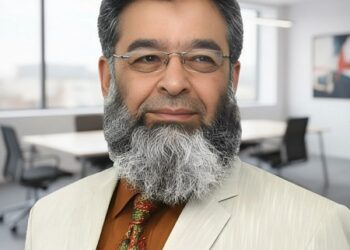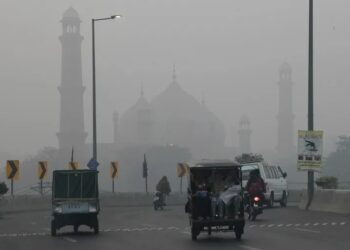Written by: Abdul Basit Alvi
In today’s fast-paced world, the importance of peace, love, and unity cannot be emphasized enough. These values serve as the foundation of a society where people coexist harmoniously, driving progress and mutual respect. When these principles are present, they lead to stability, prosperity, and an enhanced quality of life for all. Conversely, their absence breeds division, conflict, and suffering.
Peace is the essential element upon which a thriving society is built. It goes beyond the mere absence of war or conflict; it signifies the absence of social unrest, injustice, and inequality. In peaceful societies, people feel secure enough to pursue their dreams without fear or disruption. When peace prevails, citizens feel safe, governments operate effectively, and economies grow steadily. On a personal level, peace promotes well-being, enabling individuals to focus on education, career, and relationships without the constant threat of violence or instability. Peace also encourages dialogue and cooperation, resolving conflicts peacefully rather than through violence. Internationally, peace is equally crucial, as relationships between nations should be based on mutual respect and understanding. It creates the conditions for diplomacy, trade, and collaboration that benefit both individual countries and the global community. In the absence of peace, tensions rise, leading to war, economic collapse, and widespread suffering.
Love, in its purest form, embodies care, empathy, and understanding for others. It is the emotional bond that unites people, regardless of their background, culture, or beliefs. Love ensures that individuals are treated with kindness, respect, and dignity, creating a supportive and cooperative environment. It fosters compassion and motivates people to help those in need, whether through charitable acts, social systems, or personal connections. Love encourages individuals to look beyond their own lives and recognize the shared humanity they have with others, creating a culture of understanding where differences are celebrated, not feared. Furthermore, love nurtures forgiveness and reconciliation. In societies filled with love, people are more likely to resolve conflicts peacefully and constructively, leading to lasting solutions that benefit the entire community and promote inclusivity.
Unity refers to the sense of togetherness and solidarity in a society, where people work toward common goals and collective success. It is about overcoming divisions—whether ethnic, religious, or socio-economic—and recognizing the strength that comes from collaboration. Unity does not mean eliminating differences but embracing diversity while ensuring equal opportunities for all. In a unified society, people are more likely to cooperate in addressing shared challenges, such as economic inequality, environmental issues, or social injustices. A community united in purpose can achieve much more than individuals acting alone. Unity also supports the concept of social justice, ensuring that all people are treated fairly and have access to the resources and opportunities they need to thrive. It creates a sense of belonging and security for everyone, which is crucial for both individual and societal growth. When people feel valued and included, they are more likely to contribute positively to the community.
Peace, love, and unity are deeply interconnected and mutually reinforcing. A peaceful society prioritizes love and compassion, while unity is nurtured through shared understanding. Together, they create a harmonious, thriving community. In the same way, love and unity cannot thrive without peace. Conflict and division are the opposites of love and unity, and without unity, peace becomes fragile. These values work together to foster a thriving and prosperous society. When peace, love, and unity are abundant, they strengthen relationships both personally and within the community. People are more inclined to collaborate for the collective good and are better equipped to face challenges with patience, empathy, and resilience. A society rooted in peace, love, and unity can achieve not only material prosperity but also emotional and social well-being, raising the standard of living for all its members. Effective leadership plays a vital role in nurturing peace, love, and unity within a community. Leaders, whether in government, organizations, or local communities, set the tone for how individuals relate to one another. A leader who advocates for peaceful resolutions, fosters love and empathy, and emphasizes the importance of unity can inspire others to adopt these values in their own lives. Furthermore, leaders must be transparent and accountable, working to address inequality, promote social justice, and ensure fair treatment for all. By prioritizing the well-being of every member and fostering inclusivity, leaders can cultivate a culture where peace, love, and unity are not just cherished but actively pursued.
On the other hand, the presence of hate, chaos, and division in any society can have devastating consequences for its stability, prosperity, and overall well-being. These harmful forces tear apart the social fabric that binds communities together, disrupt peaceful coexistence, and impede progress. The effects of hate, chaos, and division can take many forms, but ultimately, they lead to a fractured society characterized by instability, inequality, and violence. Hate is a powerful emotion that, if left unchecked, can result in significant conflict and violence within a society. Often fueled by prejudice, ignorance, and misunderstanding, hate can be directed at various groups based on ethnicity, religion, political beliefs, or other differences. When hatred prevails, social harmony deteriorates, and an atmosphere of aggression and hostility takes root.
In a society where hate dominates, violent acts—ranging from physical assaults to hate crimes and large-scale violence—become more common. This can spiral into civil unrest, such as protests turning violent or, in extreme cases, full-blown civil wars. The breakdown of law and order makes it difficult to maintain a functional society, as fear and distrust replace cooperation and empathy. Victims of hate crimes or violence often suffer not just physical harm but long-lasting psychological trauma, further damaging the social fabric. One of the most damaging impacts of hate and division is the erosion of trust among society’s members. Trust is essential for community functioning, as it allows individuals to collaborate, share resources, and work toward common goals. When hate and division take root, trust between different groups breaks down. People become wary of one another, fearing betrayal, discrimination, or exploitation, leading to greater social fragmentation, where groups become more isolated and mistrustful.
Social cohesion weakens further when division becomes the norm. Societies marked by racial, religious, or ideological divides are less likely to unite in addressing shared challenges. Political polarization, for instance, can lead to legislative gridlock, where leaders focus on defeating the “opposing side” instead of tackling urgent issues like poverty, healthcare, and education. Without unity, collective action becomes nearly impossible, and the potential for societal progress is greatly diminished. Hate, chaos, and division also bring significant economic consequences. In a divided society, the benefits of economic growth are often unevenly shared. Groups that suffer from discrimination or marginalization due to hate and division may be denied access to education, employment, and political participation. This perpetuates systemic inequality, where certain communities face higher levels of poverty, unemployment, and limited access to resources. Additionally, widespread anarchy and instability can severely disrupt economic activities. Civil unrest or violent protests can interfere with business operations, and investors may be reluctant to invest in a society plagued by political instability. As trust in the economic system erodes, businesses may relocate, trade can be disrupted, and jobs may be lost. Economic instability resulting from hate, anarchy, and division leads to higher unemployment rates, further hindering marginalized communities’ ability to escape poverty. In response to these challenges, governments often increase their control over society. Beyond the tangible impacts of hate and division, there are significant psychological and emotional tolls on individuals living in such environments. Constant exposure to conflict, fear, and violence can trigger a range of mental health issues, including anxiety, depression and other emotional disorders. Children raised in such environments are especially vulnerable, as they may internalize harmful behaviors and attitudes, perpetuating the cycle of animosity. Social divisions also create an “us versus them” mentality, fostering suspicion, resentment, and hostility. This dehumanization of others deepens the psychological divide between groups, making it more difficult to cultivate empathy and compassion. The emotional toll of living in a divided society contributes to a decline in overall mental well-being and an increase in issues like substance abuse, self-harm, and suicide.
In societies marked by hate and division, democratic principles such as equality, justice, and the rule of law can become distorted. When divisions run deep, political leaders may exploit these rifts to gain power, prioritizing control over promoting unity and the common good. As a result, the political process becomes less about serving the people and more about catering to specific interest groups. Elections transform from exercises in civic participation to divisive events, while political discourse degrades into personal attacks, misinformation, and polarization. This leads to widespread disillusionment with the political system, lower voter turnout, cynicism about government effectiveness, and a decline in trust in the democratic process. Over time, the erosion of democratic norms weakens institutions, making the government less responsive and fueling public apathy.
Division based on hate or prejudice often leads to the marginalization of entire groups, whether based on race, religion, gender, or socioeconomic status. In a divided society, certain groups may be excluded from essential resources such as education, healthcare, housing, and employment opportunities. This exclusion fosters resentment and disenfranchisement, further entrenching societal divisions. Social exclusion also creates fertile ground for extremism, as individuals feeling alienated may be drawn to radical ideologies that offer a sense of belonging or promise to address their perceived grievances. The rise of extremist groups can destabilize society, leading to more violence and perpetuating the cycle of hate.
In the context of Azad Jammu and Kashmir (AJK), also known as “Azad Kashmir,” the region is located in the northern part of Pakistan and is famous for its picturesque landscapes, stunning valleys, and rich cultural heritage. AJK is celebrated for its natural beauty and peaceful atmosphere, but beyond the breathtaking views, it is home to a unique culture of love, peace, and unity, deeply rooted in its history, people, and traditions. Despite the region’s political complexities and its proximity to the disputed Kashmir region, AJK has remained a symbol of harmony and mutual respect among its diverse communities. AJK’s history has been integral in shaping its current culture of peace and unity. Its strategic location, nestled in the foothills of the Himalayas and bordering India-illegally occupied Kashmir, has made it a focal point of political conflict. However, despite being located in one of South Asia’s most politically sensitive areas, AJK has managed to maintain a relatively peaceful atmosphere. In 1947, the Partition of India led to the creation of both Pakistan and India, leaving the princely state of Jammu and Kashmir with the decision of choosing to accede to one of the newly formed nations. The choice to join Pakistan triggered the first Kashmir war from 1947-1948, resulting in the division of the region and the formation of AJK as a self-governing entity under Pakistan. Despite facing political challenges, AJK has successfully preserved a unique identity centered around the well-being and unity of its people. This identity has been nurtured through a shared sense of belonging, respect for diversity, and a collective desire for peace. AJK is home to a diverse population, with various ethnic, religious, and linguistic communities living together in harmony. The region is primarily inhabited by Punjabis, Paharis, Mirpuris, and Gujjars, with Islam being the dominant religion. This diversity is embraced through festivals, ceremonies, and daily interactions, fostering an atmosphere of mutual respect. Eid and other religious festivals are celebrated with enthusiasm across all communities, promoting interfaith harmony and solidarity. The sharing of food, exchanging greetings, and collective participation in cultural events break down barriers and strengthen the spirit of unity. For example, during Eid celebrations, it is common to see people from different communities coming together to share meals and celebrate. This openness and inclusivity, where cultural and religious boundaries are respected, form the foundation of AJK’s peaceful coexistence.
Family and community play a central role in shaping individual values and social norms in AJK. The concept of “Izzat” (honor) is deeply ingrained in the culture, and maintaining peace and unity within the family and community is of utmost importance. Families in AJK often live in close-knit units, with strong bonds between extended families and neighbors. This interconnectedness creates an environment where cooperation and mutual support come naturally. During times of hardship or celebration, people in AJK rely on their communities for support. The strong network of social support helps individuals navigate personal loss, economic challenges, or even natural disasters like earthquakes and floods, which the region has faced in the past. The tradition of “bhaiwali” (a code of honor and hospitality) is also common, where kindness, respect, and helping others in need are essential values. This sense of hospitality extends to visitors and strangers, reinforcing the ideals of love, compassion, and peace.
Education plays a vital role in promoting peace and unity in AJK. The region has made significant investments in improving educational infrastructure and ensuring access to quality education. Schools and colleges across AJK not only focus on academics but also emphasize moral values, community service, and social cohesion. Educational institutions in the region shape young minds to understand and appreciate diversity, tolerance, and peaceful coexistence. Students from different backgrounds learn to collaborate, respect differences, and participate in activities that promote social harmony. This inclusive education system nurtures a generation that prioritizes unity over division and peace over conflict. Additionally, AJK has seen the growth of several universities and institutions that attract students from all over Pakistan, enhancing cultural exchange and mutual understanding. The peaceful atmosphere of the region creates an ideal environment for educational and personal growth, contributing to the overall peace and progress of society.
The region’s stunning landscapes also contribute to fostering a culture of peace. The beautiful valleys of Neelum, Rawalakot, and Bagh, along with serene lakes, rivers, and forests, have long been a source of inspiration for the people of AJK. Nature is not just a backdrop but a source of spirituality and tranquility. The natural environment plays a key role in shaping the cultural values of the people, many of whom view their surroundings as symbols of harmony and balance. The people of AJK often describe their region as a “paradise on earth,” with the tranquility and serenity of the natural surroundings mirroring their approach to life. This strong bond with nature cultivates a profound sense of inner peace, which is reflected in the community’s collective behavior. The residents are recognized for their hospitality, calm demeanor, and peaceful attitudes, all of which are deeply rooted in their connection to the natural world. Furthermore, the tourism industry in AJK has thrived due to the region’s breathtaking landscapes. Tourists from all over the world visit AJK, not only to enjoy the stunning scenery but also to experience the peace and tranquility that the area offers. The warm hospitality extended by the locals reflects the peaceful nature of AJK society, where visitors are welcomed with kindness and respect.
Regrettably, some elements in AJK aim to undermine this remarkable culture. In recent months, the Awami Action Committee (AAC) has emerged as a pressure group and a potential threat to the region’s peace and harmony. The AAC has become a controversial entity, facing allegations of contributing to social unrest and spreading hate within the region. Its activities have raised concerns about its impact on the political and social fabric of AJK.
The AAC has shifted towards more extreme tactics, alarming both citizens and political observers. It has been criticized for destabilizing political stability in AJK by exploiting divisions for political gain. The committee is often accused of backing one political faction over another, which has led to increased friction and institutional breakdowns. This is particularly harmful in a region where the democratic process is still developing and where stability is crucial for progress. By aligning itself with specific political factions, the AAC has created an environment of mistrust and competition rather than cooperation, exacerbating the political climate with accusations of corruption, nepotism, and manipulation.
The AAC has been blamed for inciting protests, boycotts, and destabilizing campaigns against its political rivals, which have further aggravated the fragile situation. The group is accused of orchestrating efforts to destabilize the AJK government, using inflammatory rhetoric to rally resistance and portray the government as controlled by external forces. These actions have been viewed as attempts to undermine the legitimacy of the elected government and create a power vacuum that the AAC hopes to exploit. As a result, the AAC’s actions have contributed to an atmosphere of lawlessness and unrest, leading to greater instability in the region.
Observers have also taken note of the AAC’s role in destabilizing the region for personal political gain. The AAC’s controversial activities are largely driven by its tendency to incite hate and violence. It has been accused of using hate speech and promoting divisive rhetoric to fuel animosity between ethnic and religious groups within AJK. Through its online campaigns, the AAC has spread inflammatory messages, escalating tensions and undermining peaceful coexistence. The group’s leaders often adopt nationalist rhetoric, mixing anti-Pakistan sentiments in ways that portray Pakistan as an oppressor of Kashmiris. While advocating for the rights of Kashmiris is important, such divisive rhetoric only weakens constructive dialogue, fostering violence and enmity among groups. Critics contend that the AAC’s actions, driven by ideological extremism, are pushing the people of AJK further from peaceful coexistence and toward a potential collapse of the region’s social fabric. The AAC has played a key role in leveraging modern media, particularly social media, to disseminate its divisive ideology. Its presence on digital platforms has significantly expanded its reach, allowing it to influence a wide audience. By manipulating information, spreading misinformation, and using provocative images and videos, the AAC has stirred emotions and created widespread chaos. Their activities on digital platforms have fueled misinformation, leading to confusion and fear in the region. The group’s use of social media to target political rivals and advance its own agenda has sparked online disputes, resulting in verbal abuse and even physical confrontations. This manipulation of media undermines the ability of citizens to distinguish between truth and falsehood, jeopardizing the region’s peace and security.
The political agenda of the Awami Action Committee is rooted in populist rhetoric, often grounded in unrealistic and unattainable goals. The AAC’s strong anti-Pakistan stance suggests that their actions are supported by external forces, notably India and nationalist elements operating abroad. These external supporters, many of whom have sought asylum under false pretenses, appear to be fueling the group’s divisive rhetoric. Viewed through the lens of criminality and terrorism, the actions of the AAC are indefensible. Their violent protests, which have included attacks on ambulances and police vehicles, as well as damage to civil and private property, reflect a dangerous and hostile mindset. Moreover, their rhetoric on social media, often laced with abusive threats or mockery, further exemplifies their disruptive behavior. Indian media have even celebrated AAC’s attacks on local institutions, adding to the international. Even after their demands were met, the AAC chose to escalate tensions by attacking AJK’s capital. For many in AJK, groups like the AAC are seen as pressure organizations bent on isolating the people from the system, sowing division, and spreading hatred. Whether it’s the BLA or the AAC, extremist and nationalist mindsets pose a serious threat to the peace and unity of both AJK and Pakistan. Nationalism is like a spreading disease, affecting various regions. In Balochistan, nationalist militants recently killed seven innocent people simply because they were not locals. Previously, they also targeted and killed laborers from Kashmir. Such actions directly contradict the teachings of Islam, which eradicated such divisions and granted all Muslims equal rights and status. Those who commit these crimes either lack knowledge of their faith or deliberately rebel against it. A similar mindset exists among a small faction in Kashmir, where some individuals promote violence, display hostility, and seek to demean others. This secular ideology is a dangerous poison for an Islamic society, and people of Pakistan and AJK must safeguard themselves and their communities from its harmful influence.
As the AAC’s divisive actions intensify, calls for accountability are growing. Both political analysts and human rights organizations have urged local and international communities to hold the AAC responsible for its destabilizing impact. Many view the AAC’s activities as a direct threat to the long-term peace and progress of AJK. It is widely believed that unless such groups are held accountable, the region will continue to suffer from violence, chaos, and division. The people of AJK deserve leadership that fosters social harmony, peaceful dialogue, and a united push for self-determination. Acknowledging the destructive consequences of extremist and nationalist actions, including those of the groups like BLA and AAC, is essential to counteracting their negative impact on the peace and prosperity of both AJK and Pakistan. Only by addressing these divisive forces can AJK and Pakistan begin to heal and build a more unified future.

























